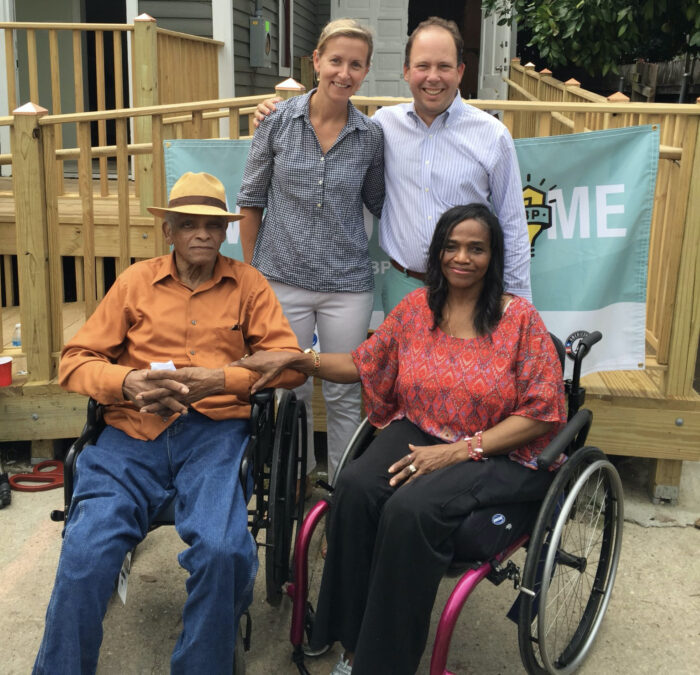Today we commemorate the 15th anniversary of Hurricane Katrina, an event that forever changed the lives of hundreds of thousands of people across Louisiana and Mississippi. It was the storm that brought Liz and me to New Orleans to volunteer 6 months later, but it was the people who we met and who were struggling to survive in St. Bernard Parish in those first two weeks who compelled us to stay.
People like Mr. Andre, an 80-something WWII veteran who had a career as a steelworker and who was living in his pickup truck. People like Bob, a Korean War veteran and long-time police officer who was living in his attic. People like Dawn, a multiple generation fisherwoman, who despite losing her home, business and vehicles was most concerned about what she could do to help others.
The existing disaster recovery system wasn’t working for our new friends. They had no clear path forward. They faced an abyss of uncertainty. Something needed to be done. We couldn’t just tell Dawn, Mr. Andre, Bob and others: “Nice to meet you. Good luck. Hang in there.” We were naive and young enough to try to fix it.
Thousands of rebuilt houses later - not just in New Orleans and St. Bernard Parish, but also in disaster-impacted communities across the country and in the Bahamas - I’m writing this to share lessons learned so that other Americans don’t have to face the same preventable delays endured by 15 years ago.
I write this while our neighbors in southwest Louisiana and Texas are emerging from Hurricane Laura’s battering. Over the coming days and at a time when we are told to stay home, families will feel the immediate financial, emotional and physical peril of losing their homes. They will look for signs of hope: a promise that the government will be there, an army of volunteers, a nod from neighbors that, yes, while this is hard and while answers are unclear, they will get through it together.
The disaster recovery system in America is broken, causing many people to reach their breaking point while trying to navigate the dysfunctional system. Those who are most vulnerable fall prey to the inequity of the current FEMA damage assessment program and are the most negatively affected by protracted federal grant programs. By creating resilience - preparing people before disaster, helping them navigate recovery after, developing upstream solutions and rebuilding efficiently - SBP restores opportunity and security for people and communities. Our solutions make recovery easier, faster and more predictable. They may sound simple but will have profound impact:
- One App - A single application, instead of three separate applications, for federal disaster assistance. This will simplify the process for survivors, maximize critical recovery time and reduce duplication between agencies.
- FEMA Remote Damage Assessment Technology - Utilize satellite and drone technology and big data, which are routinely used in the private sector to calculate damage, rather than sending individuals to assess damage in person. This solution is cheaper, faster and more accurate.
- Recovery Acceleration Fund - Use philanthropic dollars to underwrite loans for low- to moderate-income homeowners and repay initial loans with federal disaster funds. This model will reduce the time it takes for low income households to rebuild by at least 3 years.
What America can’t and shouldn’t change is our desires - as private citizens - to fix and solve and help. At SBP alone, we’ve hosted over 200,000 volunteers from around the country to help people they have never before met. And, since nearly day one, thousands of AmeriCorps members have served with SBP recruiting and managing volunteers, working directly with clients and leveraging America’s true commitment to each other.
Katrina was not the first major disaster, and Laura surely won’t be the last. Human need is what continues to propel all of us at SBP to do everything we can to shrink the time between disaster and recovery and prevent the people we serve from being pushed beyond their breaking points. It’s the preventable human suffering that drives our necessity to repair the disaster resilience and recovery system.
We are grateful for your partnership, support and the impact you have helped create for families across the country.

Thanks to our supporters we have hosted thousands of Welcome Home parties including this one with Melvin and Etta Baham.

